The AMD Ryzen Threadripper 1950X and 1920X Review: CPUs on Steroids
by Ian Cutress on August 10, 2017 9:00 AM ESTCPU Encoding Tests
One of the interesting elements on modern processors is encoding performance. This includes encryption/decryption, as well as video transcoding from one video format to another. In the encrypt/decrypt scenario, this remains pertinent to on-the-fly encryption of sensitive data - a process by which more modern devices are leaning to for software security. Video transcoding as a tool to adjust the quality, file size and resolution of a video file has boomed in recent years, such as providing the optimum video for devices before consumption, or for game streamers who are wanting to upload the output from their video camera in real-time. As we move into live 3D video, this task will only get more strenuous, and it turns out that the performance of certain algorithms is a function of the input/output of the content.
All of our benchmark results can also be found in our benchmark engine, Bench.
7-Zip 9.2: link
One of the freeware compression tools that offers good scaling performance between processors is 7-Zip. It runs under an open-source licence, is fast, and easy to use tool for power users. We run the benchmark mode via the command line for four loops and take the output score.
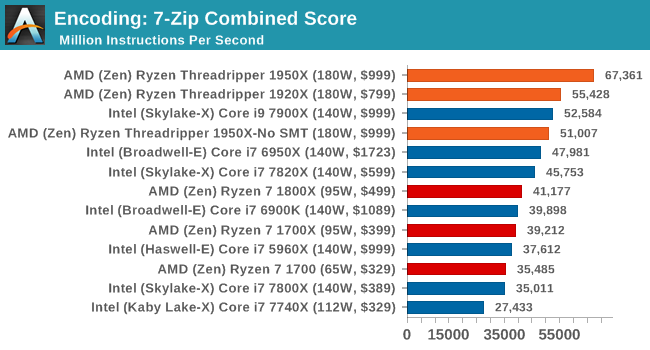
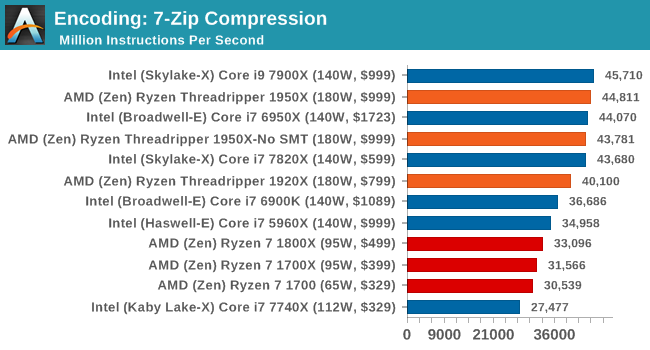
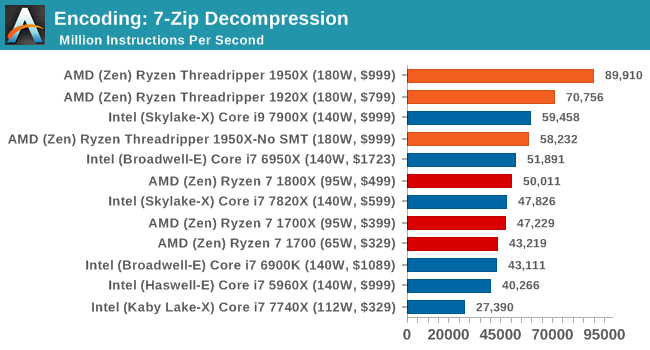
At the request of a few users, we've gone back through our saved benchmark data and pulled out compression/decompression numbers for 7-zip. AMD clearly makes a win here in decompression by a long way.
WinRAR 5.40: link
For the 2017 test suite, we move to the latest version of WinRAR in our compression test. WinRAR in some quarters is more user friendly that 7-Zip, hence its inclusion. Rather than use a benchmark mode as we did with 7-Zip, here we take a set of files representative of a generic stack (33 video files in 1.37 GB, 2834 smaller website files in 370 folders in 150 MB) of compressible and incompressible formats. The results shown are the time taken to encode the file. Due to DRAM caching, we run the test 10 times and take the average of the last five runs when the benchmark is in a steady state.
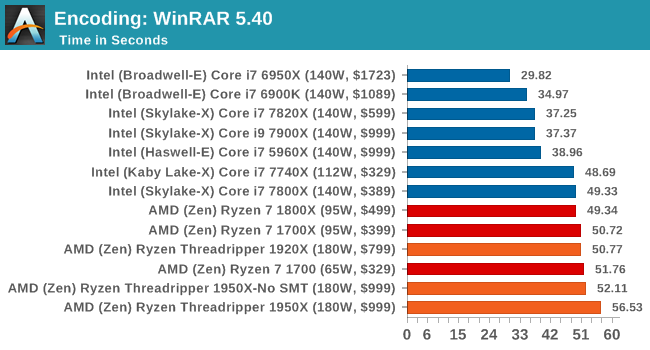
WinRAR encoding is another test that doesn't scale up especially well with thread counts. After only a few threads, most of its MT performance gains have been achieved. Which isn't a help to Threadripper, and is outright a hiderence in Creator Mode.
AES Encoding
Algorithms using AES coding have spread far and wide as a ubiquitous tool for encryption. Again, this is another CPU limited test, and modern CPUs have special AES pathways to accelerate their performance. We often see scaling in both frequency and cores with this benchmark. We use the latest version of TrueCrypt and run its benchmark mode over 1GB of in-DRAM data. Results shown are the GB/s average of encryption and decryption.
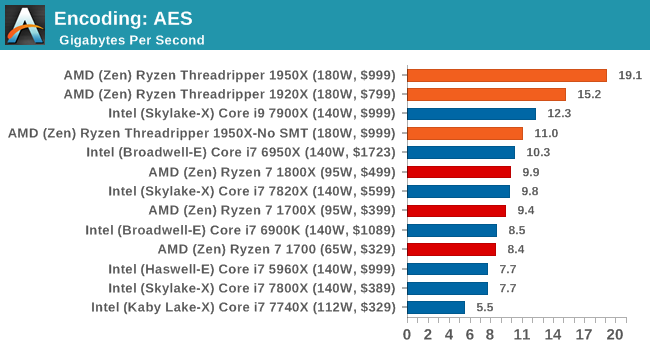
HandBrake v1.0.2 H264 and HEVC: link
As mentioned above, video transcoding (both encode and decode) is a hot topic in performance metrics as more and more content is being created. First consideration is the standard in which the video is encoded, which can be lossless or lossy, trade performance for file-size, trade quality for file-size, or all of the above can increase encoding rates to help accelerate decoding rates. Alongside Google's favorite codec, VP9, there are two others that are taking hold: H264, the older codec, is practically everywhere and is designed to be optimized for 1080p video, and HEVC (or H265) that is aimed to provide the same quality as H264 but at a lower file-size (or better quality for the same size). HEVC is important as 4K is streamed over the air, meaning less bits need to be transferred for the same quality content.
Handbrake is a favored tool for transcoding, and so our test regime takes care of three areas.
Low Quality/Resolution H264: Here we transcode a 640x266 H264 rip of a 2 hour film, and change the encoding from Main profile to High profile, using the very-fast preset.
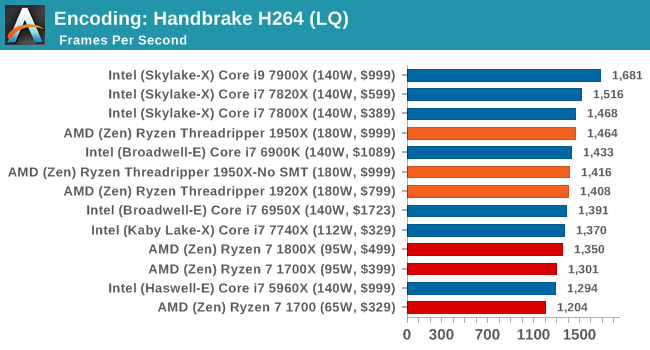
High Quality/Resolution H264: A similar test, but this time we take a ten-minute double 4K (3840x4320) file running at 60 Hz and transcode from Main to High, using the very-fast preset.
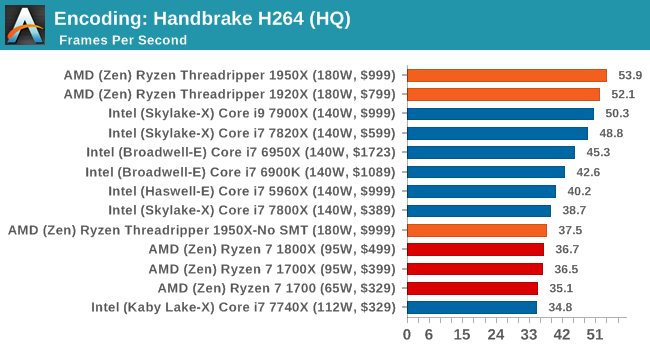
HEVC Test: Using the same video in HQ, we change the resolution and codec of the original video from 4K60 in H264 into 4K60 HEVC.
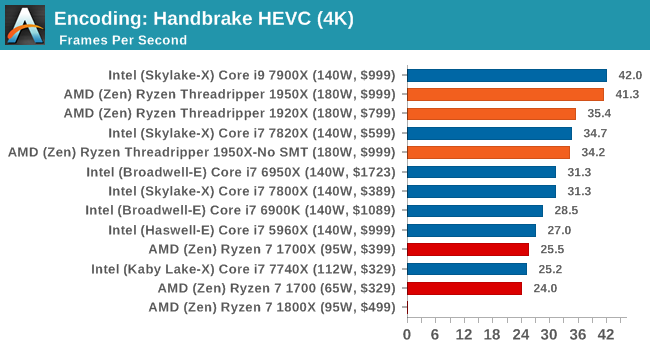
In the HQ H264 test, AMD pushes ahead with both the processors, while SMT-off severely limits the 1950X due to the lack of SMT threads. As we move to HEVC though, the 1950X and 7900X clash on performance.










347 Comments
View All Comments
imaheadcase - Thursday, August 10, 2017 - link
So you lost respect for a website based on how they word titles of articles? I think you don't understand advertising at all. lolIf you want to know a website that lost respect, look at HardOCP and you know why people don't like them for obvious reasons.
Alexey291 - Thursday, August 10, 2017 - link
No offence but HardOCP is far more respectable than what we have in ATech these days.But that's not hard. AT website is pretty much a shell for the forum which is where most of the traffic is. I'm sure they only so the reviews because 'it was something we have always done'
Johan Steyn - Thursday, August 10, 2017 - link
You may not understand how wording is used to convey sentiments in a different way. That is what politicians thrive on. You could for instance say "I am sorry that you misunderstood me." It gives the impression that you are sorry, but you are not. People also ask for forgiveness like this: "If I have hurt you, please forgive me." It sounds sincer, but it is a hidden lie, not acknowledging that you have actually hurt anybody, actually saying that you do not think that you did.Well, this is a science and I cannot explain it all here. If you miss it, then it does not mean it is not there.
mikato - Monday, August 14, 2017 - link
I thought I'd just comment to say I understand what you're saying and agree. Even if a sentence gives facts, it can sound more positive one way or another way based on how it is stated. The author has to do some reflection sometimes to catch this. I believe him whenever he says he doesn't have much time, and maybe that plays into it. But articles at different sites may not have this bias effect and it can be an important component of a review article."Intel recently announced that its new 18-core chip scores 3200 on Cinebench R15. That would be an extra 6.7% performance over the Threadripper 1950X for 2x the cost."
These 2 sentences give facts, but sound favorable to Intel until just the very end. It's a subtle perception thing but it's real. The facts in the sentences, however, are massively favorable to AMD. Threadripper does only 6.7% less performance than an announced (not yet released) Intel CPU for half the cost!
Here is another version-
"Intel recently announced that its new 18-core chip scores 3200 on Cinebench R15. So Threadripper, for half the cost of Intel's as-yet unreleased chip, performs only 6.7% slower in Cinebench."
There, that one leads with Threadripper and "half the cost" in the second sentence, and sounds much different.
Johan Steyn - Thursday, August 10, 2017 - link
HardOCP and PCPer is more respected in my opinion. Wccftech is unpredictable, sometimes they shine and sometimes they are really odd.mapesdhs - Thursday, August 10, 2017 - link
I've kinda taken to GamersNexus recently, but I still always read AT and toms to compare.Ian.
fanofanand - Tuesday, August 15, 2017 - link
WCCFtech is a joke, it's nothing but rumors and trolling. If you are seriously going to put WCCFtech above Anandtech then everyone here can immediately disregard all of your comments.Drumsticks - Thursday, August 10, 2017 - link
Fantastic review In. I was curious exactly how AMD would handle the NUMA problem with Threadripper. It seems that anybody buying Threadripper for real work is going to have to continue being very aware of exactly what configuration gets them the best performance.One minor correction, at the bottom of the CPU Rendering tests page:
"Intel recently announced that its new 18-core chip scores 3200 on Cinebench R15. That would be an extra 6.7% performance over the Threadripper 1950X for 2x the cost." - this score is for the 16 core i9-7960X, not the 7980XE.
Drumsticks - Thursday, August 10, 2017 - link
Ian*. Can't wait for the edit button one day!launchcodemexico - Thursday, August 10, 2017 - link
Why did you end all the gaming review sections with something like "Switching it to Game mode would have made better numbers..."? Why didn't you run the benchmarks in Gaming mode in the first place?